If I Snore Loudly, Do I Have Obstructive Sleep Apnea?

|8th September 2021
While some snorers only make small noises that do not disturb others during sleep, others may not be so lucky. If you or your partner snore so loudly that one wakes up the other – or
worse, you even wake up the neighbors – it is possible that you are dealing with a slightly more serious issue.
If snoring is having a negative effect on your life and sleep quality, it is helpful to know about the various different types of snoring. This way, you can get a general idea if you are a sporadic snorer or a potential OSA patient and need to see a doctor.
Primary Snoring vs. OSA-Related Snoring
Snoring is the sound that air makes as it passes through the relaxed muscles of your airways, making them vibrate while you breathe1. While annoying, it is generally harmless, and not considered a syndrome that needs acute treatment.
People snore for a variety of reasons:
- Mouth and nose anatomy – a low, thick, soft palate can narrow your airway and
facilitate snoring. - Alcohol consumption relaxes the muscles of the airway.
- Sleeping position – sleeping in the supine position (on your back) allows gravity to
narrow your airway. - Being overweight – fat deposits in the back of the throats may narrow the airways2
Obstructive sleep apnea or OSA is a sleep disorder in which your throat muscles intermittently relax and block your airway during sleep3. In essence, if snoring causes your throat muscles to reduce your upper airway’s size, OSA can cause it to collapse entirely, forcing you to wake up rapidly in order to draw air. It is important to distinguish between the two, as not everyone who snores has OSA. However, loud snoring is one of this disorder’s characteristic signs4
.
If you experience any of the following signs and symptoms in addition to snoring, it is possible you have undiagnosed OSA:
- Excessive daytime sleepiness – most people with OSA complain about unrefreshing
sleep and tiredness because they often wake up gasping or choking during the night. - Snoring very loudly – habitual snoring is present in 50-60% of OSA patients5
- Witnessed breathing pauses during sleep
- Gasping or choking at night
- Morning sore throat, dry mouth, or headaches
- Frequent need to wake up to urinate
If you have any of the symptoms listed here, seek specialized help. OSA is a serious medical condition, and it can impact your overall health and quality of life if left untreated.
While visiting a doctor, you will likely be asked to undergo a sleep test to measure your quality of sleep and determine whether you have OSA and, if so, how severe it is. However, even if you are diagnosed with OSA, you need not worry – it is a common syndrome in adults over the age of thirty and a variety of treatment options are available for you.
Available Treatments for Obstructive Sleep Apnea
The first possible treatment is the one requiring the least medical intervention – making changes such as losing weight, avoiding alcohol and smoking, and avoiding sleeping on your back if you have positional sleep apnea (i.e. you only experience it in a particular sleeping position).
If this is insufficient, it is possible you will require a device supporting your treatment. The longest-used method is called Positive Airway Pressure (PAP), which is a treatment you undertake while sleeping. A specialized machine delivers pressure through a mask worn over the nose and mouth, preventing airway obstruction during sleep. However, wearing the mask can be uncomfortable for some people, particularly those with claustrophobia, and the mask must be worn regularly throughout the night to ensure maximum effect.
Nowadays, your treatment options also include eXciteOSA®, the world’s first daytime therapy for OSA patients. The device is used during the day, for 20 minutes at a time, for a period of 6 weeks. Using clinically proven neuromuscular electrical stimulation, the intraoral device rests on your tongue and stimulates the muscles directly to improve their strength and endurance. This then prevents them from collapsing in the first place, tackling the root of the problem directly. With its innovative, low-touch, and COVID-safe approach, eXciteOSA® can be used on the go, whenever you need it.
References
-
- Meyer MMD De, Jacquet W, Vanderveken OM, Marks LAM. Systematic review of the different aspects of primary snoring. Sleep Med Rev [Internet]. 2019;45:88–94. Available from: https://doi.org/10.1016/j.smrv.2019.03.001
- Schwab RJ. Snoring – Neurologic Disorders – MSD Manual Professional Edition. 2020. p. 1–6.
- Ralls F, Cutchen L. A contemporary review of obstructive sleep apnea. Curr Opin. 2019;25(6):578–93.
- Gould J. Sleep Apnea. 2020. p. 1–10.
- Daniel J. Gottlieb, MD, MPH; Naresh M. Punjabi, MD P, IMPORTANCE. Diagnosis and Management of Obstructive Sleep Apnea A Review. Clin Rev JA. 2020;14:1389–400.

